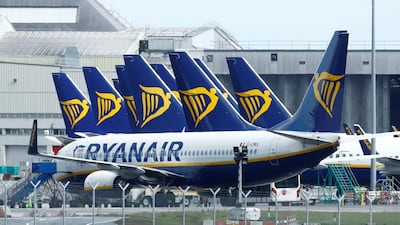Ryanair Holdings boosted its liquidity with a £600 million (Dh2.67 billion) loan backed by the UK government and said the coronavirus crisis will reduce passenger numbers by half over the next year.
Europe’s biggest low-cost carrier is tapping Britain’s Covid Corporate Financing Facility as it digs in for a slow recovery that’s set to see a price war across a much-diminished air travel market, it said in a statement on Monday. Group operations are under review and its Austrian arm could close.
While chief executive Michael O’Leary aims to resume flying in July in a bid to rescue at least some revenue this summer, Ryanair said it expects to carry fewer than 80 million passengers in the 12 months through to March 2021, compared with an original target of 154 million. Bookings are edging up, but not enough to stem losses in what’s usually its peak season.
“We’re seeing a little bit of a pickup,” chief financial officer Neil Sorahan said. “There’s definitely people starting to look at kind-of August/September out to get some sun before the kids go back to school.”
The company said it will book a loss of more than €200m (Dh794.3m) for the June quarter and a smaller hit in the following three months to September.
Ryanair shares were trading 7.5 per cent higher at €9.08 at 12.53pm UAE time on Monday, paring the stock’s decline this year to below 40 per cent.
The company, which is headquartered in Dublin but counts London Stansted as its biggest base, tapped the UK’s support programme after vehemently arguing against aid for its rivals, though Mr Sorahan said the funding doesn’t compare to billions of euros destined for German flag carrier Lufthansa and Air France-KLM.
The Bank of England-administered CCFF is available to all firms with an investment grade credit rating “whether you’re a house builder, an airline or a boot manufacturer”, Mr Sorahan said. “It’s not illegal state aid.”
The funding lifts Ryanair’s cash balance to €4.1bn, giving it “one of the strongest cash positions in the industry,” according to Sanford C. Bernstein analyst Daniel Roeska, who said the company could probably withstand a shutdown beyond the end of the calendar year without a need for fresh equity.
Mr O’Leary is also slashing costs by deferring capital investments, suspending share buybacks and cutting management pay, and plans to eliminate 3,000 pilot, cabin crew and office jobs, with remaining staff taking a 20 per cent salary cut. With more than 99 per cent of flights grounded, the airline's average weekly cash burn has dropped from €200m in March to just over €60m.
Active negotiations are under way with Boeing about reducing planned deliveries of 737 Max jets – a model currently grounded after two crashes – over the next 24 months to reflect slower traffic, as well as with leasing firms providing Airbus SE A320s to the Vienna-based Lauda arm.
Expenses at Lauda, acquired in 2018, remain ahead of the rest of the group, and with Lufthansa’s Austrian arm set to receive about €800m in support the business’s future is in doubt, according to the statement. The base will close at the end of this month with more than 300 job losses if cost cuts aren’t achieved, it said.
”Lauda is a massive challenge,” Mr Sorahan said. “There’s a restructuring going on which requires significant cost cutting. If that doesn’t happen then unfortunately the base will have to close and the A320s will have to come out.”
Ryanair reported a profit of €1bn for fiscal 2020, before exceptional items, within its guided range of €950m-€1.05bn. The net figure was dragged down by a €353m charge against losses from jetfuel hedges.

